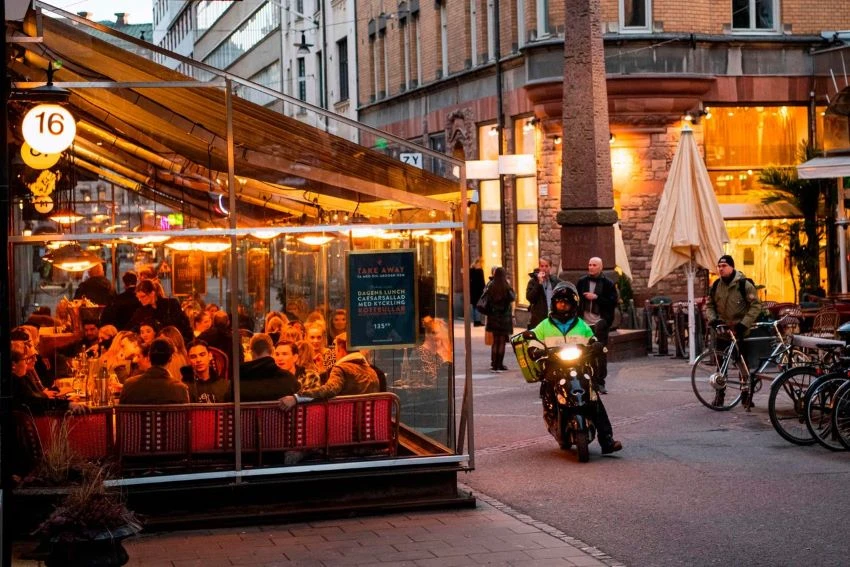
The ski pistes are open, the restaurants are doing ample business and the malls are awash with shoppers.
Welcome to Sweden, the last holdout among the small number of Western countries to have taken a radically different approach to the coronavirus pandemic.
While social life in Europe and much of the U.S. now centers on the home after governments imposed increasingly drastic curbs on freedom of movement, Sweden left offices and stores open, issued recommendations rather than restrictions, and waited to see what happens.
Businesses, kindergartens and schools remain open. After a long winter, Stockholm’s street cafes and outdoor bars swelled with people over the weekend, and the city’s old town drew large crowds as locals ventured out to enjoy the good weather. The only mandatory rules are a ban on meetings of more than 50 people and an order forcing bars and restaurants to only serve seated customers so as to avoid overcrowding.
The U.K. and the Netherlands also briefly considered letting the virus propagate through the population in a controlled manner so as to build a natural form of immunity. Both reversed course after academics warned they could face hundreds of thousands of deaths and an overwhelmed health care system.
It is too early to assess whether Sweden’s approach will have a benign or catastrophic outcome, but so far, the virus hasn’t spread widely there. Sweden, with 10 million inhabitants, had 4,028 confirmed infections and 146 deaths by Monday, according to a tally compiled by Johns Hopkins University. Austria, a similarly-sized European country with about 8.8 million people that is under lockdown, had 9,200 cases and 108 deaths.
Anders Tegnell, Sweden’s chief epidemiologist and architect of the policy, says the approach, much like the original British one, is to let the virus spread as slow as possible while sheltering the elderly and the vulnerable until much of the population becomes naturally immune or a vaccine becomes available.
The next two weeks will determine whether Sweden’s approach can succeed or if authorities bend to the reality of a rash of new cases, said Dr. Cecilia Söderberg-Nauclér, a physician and professor at the Karolinska Institute. She predicted the government would be forced to retreat because the virus was out of control due to the absence of restrictions and testing. Asian countries that have managed to avoid lockdowns relied on mass testing to isolate positive cases and stop the contagion, she said.
Sweden has a long tradition of favoring voluntary guidelines—which call on the elderly to self-isolate and the young to reduce social mobility—over coercive measures. Dr. Tegnell said that could lead to higher compliance.
“A majority of people will stay home if they get symptoms,” he said. “We want to slow down the epidemic until Sweden experiences some sort of peak, and if the peak is not too dramatic we can continue.”
Unlike in the U.K., there is little sign of a backlash against the voluntary approach from a worried public. A Novus poll last week showed 80% of people approved of a speech by Prime Minister Stefan Löfven, in which he appealed to the personal responsibility of each adult citizen to prevent the disease’s spread.
In Stockholm this past weekend, more people appeared to avoid closed spaces than the previous weekend, and travelers on public transport were sitting apart from each other. Some Stockholmers are staying home and many skiers have cut short their trips to popular resorts such as Åre. The number of people using Stockholm’s underground and commuter trains dropped by 50% last week, according to Storstockholms Lokaltrafik, the public transport company.
Some European experts and officials, including Ansgar Lohse, a prominent German doctor, and Sir Patrick Vallance, chief scientific adviser to the British government, have praised the approach.
But even some of these proponents say it might be hard to replicate outside the specific context of Scandinavia. In Swedish culture, they note, generations don’t interact as much as they do in, say Italy. More than half of Swedish households consist of a single person, according to official data. This means less risk of younger people passing on the virus to their elders.
It may also explain why a disproportionate number of Sweden’s Covid-19 deaths occurred within the country’s Somali community, whose members tend to live in cramped accommodation in poorer neighborhoods, with more intergenerational mingling and less access to government information.
Some Swedish economists have also criticized the government’s strategy as shortsighted, warning that the cost of an out-of-control epidemic could outweigh the benefits of avoiding lockdowns in the short term.
Yet the main expressions of concerns have come from scientists and doctors. Some are concerned that cases will pick up soon and fast. The Huddinge clinic in Stockholm has obtained refrigerated containers to store bodies if the death toll escalates as it has in other countries. Elective surgeries have been paused, and local authorities are building a makeshift Covid-19 clinic in Stockholm.
“This is a big and risky experiment with the entire population that could have a catastrophic outcome,” Joacim Rocklöv, a professor of epidemiology at Umeå University and one of several scientists campaigning for the government to change tack. “It is risky to leave it to people to decide what to do without any restrictions. As can be seen from other countries this is a serious disease, and Sweden is no different than other countries.”
Dr. Rocklöv’s research shows that pursuing herd immunity without suppressing the spread of the virus would overwhelm hospitals and result in large numbers of premature deaths. He is skeptical that high-risk groups can be effectively sheltered.
Fredrik Elgh, a professor of virology at Umea University, said that the current policy was frightening and called for Stockholm to be put under quarantine.
“We will be overwhelmed by cases further down the epidemic curve,” Dr. Elgh said.




















